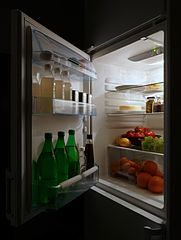FRIDGE
Smart storage solutions in the fridge of the future to reduce food waste.

Of the world's total food production, about 1/3 is thrown away, which is one of the largest single sources of greenhouse gas emissions in the world. Most of this food waste occurs in the home, where food and leftovers are are thrown away when it turns bad. Unlike other changes in consumer food habits, such as switching to vegetarian diets, purchasing eco products or selecting specific diets, it is uncontroversial to want to reduce this food waste, as it is good for the environment, climate and wallet. Nevertheless, there are no visible trends that food waste is decreasing, so finding solutions to reduce food waste is of high relevance in both the society and the research community.
Despite the rapid development of technology, very few attempts have been made to reduce food waste by utilizing new technology to bring about behavioral changes, which a reveiw study we are conducting will soon show. Furthermore, these have rarely been evaluated adequately, so the knowledge of how such digital behavioral interventions should be designed, what behavioral techniques work and how and why they work is a knowledge gap that should be filled and which in the long run can lead to both new products and a more sustainable society.
In this project, we intend to focus on one of the most important areas of food waste, namely food that is thrown from refrigerators when not used in time. We intend to develop and evaluate cheap, smart storage containers for food to be used in existing refrigerators, combining non-technical solutions such as color coding, with cheap technical solutions such as RFID tags and QR codes, aimed at increasing "food supply awareness". The solutions will be developed in close collaboration with users, and evaluated longitudinally in Swedish households.
This project has funding from Vinnova and will be carried out from 2019-01-01 - 2021-12-31
Contact persons

